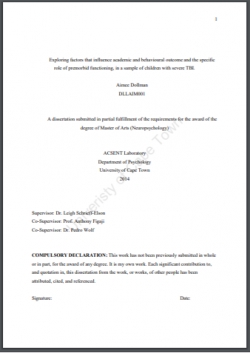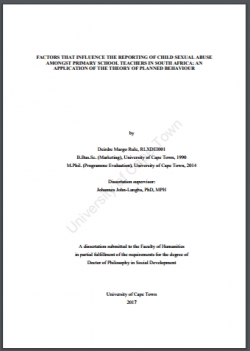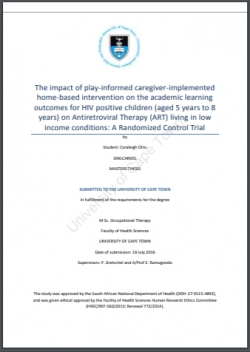Exploring factors that influence academic and behavioural outcome and the specific role of premorbid functioning, in a sample of children with severe traumatic brain injury

Type
Thesis
Authors
Category
ECCE, Foundation, Intermediate
[ Browse Items ]
Publication Year
2014
Publisher
URL
[ private ]
Pages
131 p.
Subject
Early childhood development (ECD), Vulnerable children, Severe traumatic brain injury, Outcomes, Factors influencing outcomes, Academic outcomes, Family environment, Classroom environment, South Africa
Tags
Abstract
Children who have sustained severe traumatic brain injury (TBI) demonstrate a range of deficits in neurocognitive and behavioural domains (Anderson, Northam, Hendy, &Wrennall, 2001; Babikian & Asarnow, 2009; van’t Hooft, 2010). These impairments may have adverse effects on academic and behavioural outcomes and can therefore interfere with school re-entry, educational progress, and ultimately, quality of life of the injured child (Anderson & Yeates, 2010; Keenan & Bratton, 2006; Lallo & van As, 2004). Pre-injury characteristics may increase risk for, and play a role in, TBI outcome, however, many studies exclude children with known adverse premorbid functioning (Dennis et al., 2007; Farmer etal., 2002). There are also dearth of published studies incorporating a variety of factors affecting outcome (e.g., socio economic status (SES), age at injury, time since injury, premorbid functioning, family environment) as well as academic and/or behavioural outcome variables in the same study generally. The broad aim of the study was therefore to contribute to the existing pediatric TBI (pTBI) literature on outcomes and factors influencing outcomes. In this study, I focused on investigating both academic and behavioural outcomes in a group of South African children of school-going age who had sustained a severe TBI. This study includes two parts. For the first part of the study, the aim was to explore the relationship between commonly reported factors that influence outcome after TBI (premorbid functioning, age at injury, time since injury, family environment and SES), and academic and behavioural outcome. For the second part of the study, the aim was to investigate the specific role of premorbid functioning in academic and behavioural outcome. The sample included 27 children who had been admitted to Red Cross War Memorial Children’s Hospital (RXH) and received intracranial monitoring for closed severe TBI between 2006-2011, who were of school-going age at the time of the injury. In terms of part one of the study, the results show elevated problems with academic outcome, and behavioural and executive functioning in the sample. The results also show that in this sample, factors such as family environment and premorbid functioning are particularly important with regards outcome in the home environment; while factors such as age at injury, family environment and SES play more of a role within the classroom environment.
Description
Thesis (MA)--University of Cape Town, 2014
Number of Copies
1
| Library | Accession No | Call No | Copy No | Edition | Location | Availability |
|---|---|---|---|---|---|---|
| Main | 816 | 1 | Yes |



